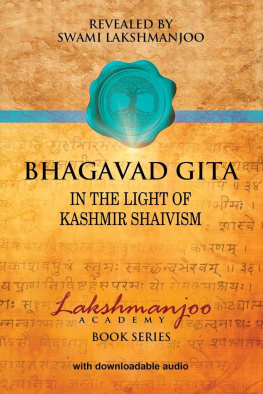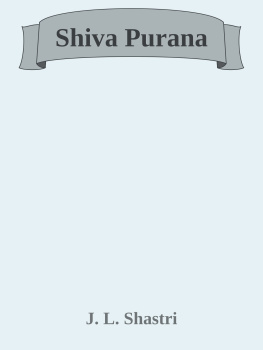The Magical Jewel of Devotion in Kashmir Shaivism
Stava Cintmai of Bhaa Nryaa
Revealed by
Swami Lakshmanjoo
WITH ORIGINAL AUDIO
John Hughes, Editor
Lakshmanjoo Academy
Published by:
Lakshmanjoo Academy
Copyright 2018 Hughes Family Trust
All rights reserved. No part of this book or the associated audio material may be used or reproduced in any manner whatsoever without written permission. No part of this book may be stored in a retrieval system or transmitted in any form or by any means including electronic, electrostatic, magnetic tape, mechanical, photocopying, recording, or otherwise without the prior permission in writing of the publisher.
First printing 2018
Printed in the United States of America
For information, address:
Lakshmanjoo Academy
www.lakshmanjooacademy.org
ISBN 978-1-947241-05-3 (paperback)
ISBN 978-1-947241-04-6 (hardcover)
ISBN 978-1-947241-06-0 (ebook)
This sacred text is dedicated to Swami Lakshmanjoo, our beloved teacher and spiritual father who has given us everything.
Glory be to Thee!
Table of Contents
Guide to Pronunciation
The following English words exemplify the pronunciation of selected Saskit vowels and consonants. The Romanized Saskit vowel or consonant is first listed and then an English word is given to aid you in its proper pronunciation.
| a | as | a in America. |
| as | a in father. |
| i | as | i in fill, lily. |
| as | i in police. |
| u | as | u in full. |
| as | u in rude. |
| i | as | ri in merrily. |
| as | ri in marine. |
| e | as | e in prey. |
| ai | as | ai in aisle. |
| o | as | o in stone. |
| au | as | ou in house |
| as | s in sure. |
| as | sh in sh un, bush |
| s | as | s in saint, sun |
Preface
Devotional hymns have always held an important place in the history of the Monistic teachings of Kashmir Shaivism. The recitation of such devotional hymns is a common part of the daily spiritual practice for many Shaiva aspirants.
Stava Cintmai, The Magical Jewel of Devotion in Kashmir Shaivism, is a sublime and unique hymn addressed to Lord Shiva, whom the author, Bhaa Nryaa, clearly holds as the Supreme Reality. Though highly devotional, these hymns are at the same time practical and deeply philosophical.
The Sanskrit text of the Stava Cintmai with Kemarjas commentary was first published in the Kashmir Series of Texts and Studies, Volume X, in Kashmir (1918). This was the text used by Swami Lakshmanjoo in his translation and commentary of this present publication.
Swamijis love for devotional hymns is evidenced by the fact that he translated and commented upon the Stava Cintmai on three occasions. The first, in 1978, was recorded by John Hughes and forms the basis of this present publication. Then, in 1990, he gave an impromptu translation during which time Denise Hughes compiled extensive hand written notes. Lastly, a recording of Swamijis recitation of the verses along with a brief translation of selected verses was recorded in Los Angeles in 1991.
To facilitate the reader, these last two renderings have been incorporated as footnotes and are indicated as Stava Cintmai (1990) and Stava Cintmai (1991), respectively. All footnotes, unless otherwise indicated, are by the editors. An appendix has been added to further assist the reader.
Lakshmanjoo Academy
9th May, 2018
This edition was not recorded.
Introduction
God and the individual are one.
To realize this is the essence of Kashmir Shaivism.
The author Bhaa Nryaa
Swami Lakshmanjoo tells us that Bhaa Nryaa was one of the most important Kashmir Shaivite masters and that he lived approximately one century before the illustrious Abhinavagupta (924-1020 CE).
This places Bhaa Nryaas time-frame somewhere between the time of Vasugupta Together these highly revered masters disseminated the foundational texts of a system of philosophy that would later become known exclusively as Kashmir Shaivism.
Thus, the ninth century was a significant period in the history of Shaiva philosophy, which Somnanda tells us had its origins almost 4,000 years earlier, at the beginning of the waxed and waned to the extent that a few generations before Bhaa Nryana their importance had all but disappeared from the mainstream of Shaiva teachings.
At that time, again out of compassion for humanity, Lord Shiva appeared in a dream to the sage Vasugupta and duly instructed him to seek out a large rock nestled on the side of a stream in the sacred Valley of Harvan.Shaivism.
In the wake of this revival of non-dual Shaivism, Bhaa Nryaa composed his Stava Cintmai. Little is known about the authors life, as he hardly mentions himself in his writings, but we read in Kemarjas commentary that the name of his grandfather was Paramevara, his father Aparjita, his mother r Daya, and his eldest brother akara.
Taking into account the spiritual climate of that generation, with the majority of the population being en-trenched in dualistic and mono-dualistic practices, something that was needed to educate sincere spiritual aspirants in the non-dual-monistic way of thought and practice. Since his commentators indicate that the Stava Cintmai was well received and highly influential, it is more than likely that Bhaa Nryaa achieved that goal.
That the author endeavored to enlighten his audience in the direction of non-dual Shaivism is evident in the inclusion of his interpretation of the ancient and highly revered Gyatri mantra, where he says:
For those sincere aspirants caught in the snare of dualistic disciplines, who were attempting to remove the obstacles to their spiritual progress and who were oblivious to the fact that such ascetic disciplines often serve to develop a distaste for the world, which, from a dualistic point of view, is declared to be an illusion (moha) and unreal (my), it must have been like a stream of nectar to hear Bhaa Nryaa boldly declare:
Jayanti! Glory be to those divine drops of knowledge which are existing in the cycle of aiva Yoga... and which have the ability of destroying and washing off all of the three impurities (malas).
With these words, Bhaa Nryaa is clearly refuting the long-held notion that ignorance is some kind of physical substance that requires a physical means for its removal. In the wake of this revival of non-dual Shaivism, it is not surprising that Bhaa Nryaas contemporary, Somnanda, begins his ivadi with a verse carrying the same spirit of Shaiva monism:
Despite the efforts of these spiritual pioneers to propagate a new revelation of non-dual Shaivism, the overall spiritual atmosphere of Kashmir continued to labor under the influence of the long-established dualistic traditions. This is evidenced by the fact that several generations after Vasugupta, Bhaa Nryaa, and Somnanda, the illustrious master, Abhinavagupta, found it necessary to continue in the spirit of his predecessors by writing a commentary on the Bhagavad Gt, and a recension on dieas (Patajali) Paramrthasra, both of which were clearly
Next page


